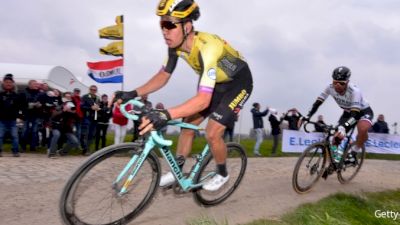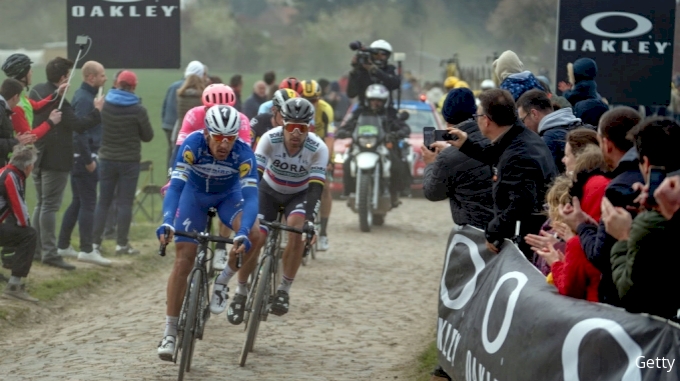The Hole In The Road Where Paris-Roubaix Should Have Been
The Hole In The Road Where Paris-Roubaix Should Have Been
The 'Hell of the North' is shut, but those who love it cannot accept that the pain may have ended for this year.

The 'Hell of the North' is shut, but those who love it cannot accept that the pain may have ended for this year.
Paris-Roubaix, one of cycling's spring one-day 'Monuments', was due to run for the 118th time on Sunday, but was postponed last month because of the Coronavirus pandemic.
There is talk of running the race, also known as the "Queen of the Classics", in the autumn, maybe as early as September.
"When sport resumes, we're going to need big events," Frenchman Marc Madiot, who won the race in 1985 and 1991, told AFP. "We'll all have an appetite.
"I'm not worried about its success. The magic will continue to work."
Much of the route is over old cobbled mining roads. The recent sunny weather means the riders would again have battled for six hours through a cloud of dust. The last truly muddy edition was in 2002.
Looking forward to an autumn race, Madiot, who manages the Groupama-FDJ team, said: "The cards will be redealt.
"The context will change, the atmosphere will also change and the equation will be new for the riders.
"For the first time, the riders will probably have a major tour in their legs before they get to the start.
"I'm very curious to see how all this works out."

The Trenches
The race had only previously been stopped twice: first, for four years because of World War I and then from 1940-2 during World War II.
In his autobiography, Madiot used a series of bellicose metaphors to describe the race, calling it a "knife fight", "the trenches" and "hand-to-hand" combat.
That language evokes the 1919 race, when competition resumed through a region devastated by four years of fighting, and a journalist from the sponsoring newspaper, L'Auto, coined the nickname "Hell of the North".
Jean-Marie Leblanc, director of the Tour de France from 1989 to 2006, described the scene in his book on Paris-Roubaix.
"No more meadows, no more hedges, no more trees, or very few, just holes, carcasses, trenches, barbed wire," he wrote.
The 1919 winner Henri Pelissier made the context clear.
"This is no longer a race but a pilgrimage," he said.
Octave Lapize, a three-time winner between 1909 and 1911, had been killed in aerial combat on July 14, 1917.
François Faber, the winner in 1913, had died at the front in 1915.
The wood in the velodrome where the race finished had been torn up to be used as fuel.
When the race resumed under German occupation in 1942, it was won by Belgian Marcel Kint, who wore the rainbow jersey for seven years because the world road championships were not held from 1939-46.
He said he rode home after the race and when he got there his family and friends did not believe he had won the Paris-Roubaix.